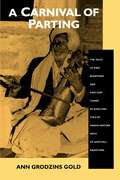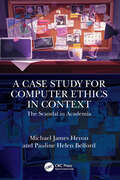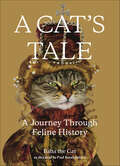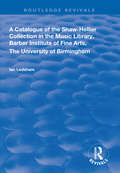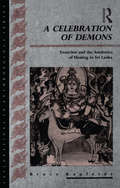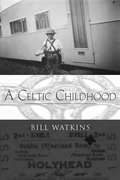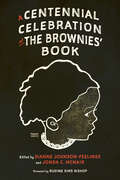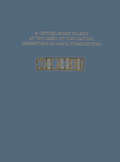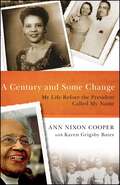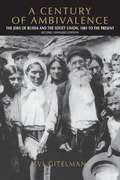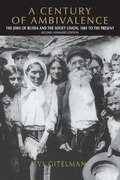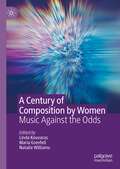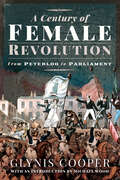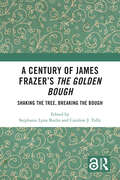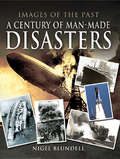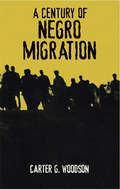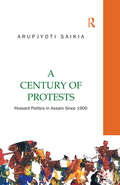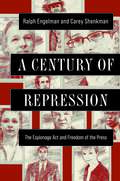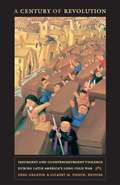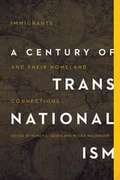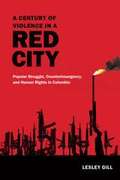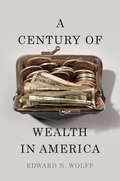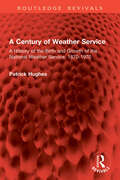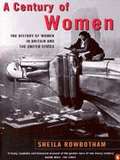- Table View
- List View
A Carnival of Parting: The Tales of King Bharthari and King Gopi Chand as Sung and Told by Madhu Natisar Nath of Ghatiyali, Rajasthan
by Ann Grodzins GoldMadhu Natisar Nath is a Rajasthani farmer with no formal schooling. He is also a singer, a musician, and a storyteller. At the center of A Carnival of Parting are Madhu Nath's oral performances of two linked tales about the legendary Indian kings, Bharthari of Ujjain and Gopi Chand of Bengal. Both characters, while still in their prime, leave thrones and families to be initiated as yogis—a process rich in adventure and melodrama, one that offers unique insights into popular Hinduism's view of world renunciation. Ann Grodzins Gold presents these living oral epic traditions as flowing narratives, transmitting to Western readers the pleasures, moods, and interactive dimensions of a village bard's performance.Three introductory chapters and an interpretive afterword, together with an appendix on the bard's language by linguist David Magier, supply A Carnival of Parting with a full range of ethnographic, historical, and cultural backgrounds. Gold gives a frank and engaging portrayal of the bard Madhu Nath and her work with him.The tales are most profoundly concerned, Gold argues, with human rather than divine realities. In a compelling afterword, she highlights their thematic emphases on politics, love, and death. Madhu Nath's vital colloquial telling of Gopi Chand and Bharthari's stories depicts renunciation as inevitable and interpersonal attachments as doomed, yet celebrates human existence as a "carnival of parting."
A Case Study for Computer Ethics in Context: The Scandal in Academia
by Michael James Heron Pauline Helen BelfordAimed at addressing the difficulties associated with teaching often abstract elements of technical ethics, this book is an extended fictional case study into the complexities of technology and social structures in complex organizations. Within this case study, an accidental discovery reveals that the algorithms of Professor John Blackbriar are not quite what they were purported to be. Over the course of 14 newspaper articles, a nebula of professional malpractice and ethical compromise is revealed, ultimately destroying the career of a prominent, successful academic.The case study touches on many topics relevant to ethics and professional conduct in computer science, and on the social structures within which computer science functions. Themes range from the growing influence of generative AI to the difficulties in explaining complex technical processes to a general audience, also touching on the environmental consequences of blockchain technology and the disproportionate gender impacts of Coronavirus. Each new revelation in the case study unveils further layers of complexity and compromise, leading to new technical and social issues that need to be addressed.Directly aimed at making ethics in the digital age accessible through the use of real-world examples, this book appeals to computer science students at all levels of the educational system, as well as making an excellent accompaniment to lecturers and course convenors alike.
A Cat's Tale: A Journey Through Feline History
by Paul Koudounaris Baba the CatA “fun, fanciful, and even informative” history of felines as revealed by a very learned tabby with a knack for hunting down facts (People).Since the dawn of civilization, felines have prowled alongside mankind as they expanded their territory and spread the myth of human greatness. And today, cats are peddled on social media as silly creatures here to amuse humans with their antics. But this is an absurd, self-centered fantasy. The true history of felines is one of heroism, love, tragedy, sacrifice, and gravitas. Not entirely convinced? Well, get ready, because Baba the Cat is here to set the record straight.Spanning almost every continent and thousands—yes, thousands—of years, Baba’s complex story of feline survival presents readers with a diverse cast of cats long forgotten: from her prehistoric feline ancestors and the ancient Egyptian cat goddess Bastet to the daring mariners at the height of oceanic discovery, key intellectuals in the Enlightenment period, revered heroes from World Wars I and II, and the infamous American tabbies. Baba, a talented model in addition to a scholar, goes beyond surface-level scratches, pairing her freshly unearthed research with a series of stunning costume portraits to bring history to life.A paws-on journey through the feline hall of fame, with in-depth research and four-legged testaments that will make you rethink who defines history, A Cat’s Tale is a one-of-a-kind chronicle that introduces readers to the illustrious ancestors of their closest companions and shows, once and for all, that cats know exactly what they’re doing.“Almost certainly the most unique cat history book ever published.” —Smithsonian Magazine
A Catalogue of the Shaw-Hellier Collection (Routledge Revivals)
by Ian LedshamIn this compilation, first published in 1999, Ian Ledsham compiles an extensive catalogue of the Shaw-Hellier Collection, complete with diagrams regarding how we use text.
A Celebration of Demons: Exorcism And The Aesthetics Of Healing In Sri Lanka
by Bruce KapfererThe Sinhalese exorcism rituals are perhaps the most complex and the most magnificent in performance still extant. For this second edition, the author has written a new preface and introduction in which he argues that the techniques of healing in Sri Lanka and the aesthetics of this healing cannot be reduced to Western psychoanalytic or psychotherapeutic terms, and develops new and original approaches to ritual and the aesthetic in general.
A Celtic Childhood
by Bill WatkinsThis first volume of a planned trilogy of memoirs reflects upon the boyhood years of Bill Watkins. The stories take place in Limerick and Wales and are told largely through dialogue. This volume includes a glossary of words and phrases. Watkins also provides the lyrics of some traditional songs.
A Centennial Celebration of The Brownies’ Book (Children's Literature Association Series)
by Dianne Johnson-Feelings and Jonda C. McNairContributions by Jani L. Barker, Rudine Sims Bishop, Julia S. Charles-Linen, Paige Gray, Dianne Johnson-Feelings, Jonda C. McNair, Sara C. VanderHaagen, and Michelle Taylor WattsThe Brownies’ Book occupies a special place in the history of African American children’s literature. Informally the children’s counterpart to the NAACP’s The Crisis magazine, it was one of the first periodicals created primarily for Black youth. Several of the objectives the creators delineated in 1919 when announcing the arrival of the publication—“To make them familiar with the history and achievements of the Negro race” and “To make colored children realize that being ‘colored’ is a beautiful, normal thing”—still resonate with contemporary creators, readers, and scholars of African American children’s literature. The meticulously researched essays in A Centennial Celebration of "The Brownies’ Book" get to the heart of The Brownies’ Book “project” using critical approaches both varied and illuminating. Contributors to the volume explore the underappreciated role of Jessie Redmon Fauset in creating The Brownies’ Book and in the cultural life of Black America; describe the young people who immersed themselves in the pages of the periodical; focus on the role of Black heroes and heroines; address The Brownies’ Book in the context of critical literacy theory; and place The Brownies’ Book within the context of Black futurity and justice. Bookending the essays are, reprinted in full, the first and last issues of the magazine. A Centennial Celebration of "The Brownies’ Book" illuminates the many ways in which the magazine—simultaneously beautiful, complicated, problematic, and inspiring—remains worthy of attention well into this century.
A Central Asian Village at the Dawn of Civilization: Excavations at Anau, Turkmenistan
by Fredrik T. HiebertThis integration of earlier and new scholarship reconceptualizes the origins of civilization, challenging the received view that the ancient Near East spawned the spread of civilization outward from Mesopotamia to all other neighboring cultures. Central Asia is here shown to have been a major player in the development of cities.Skillfully documenting the different phases of both Soviet and earlier Western external analyses along with recent excavation results, this new interpretation reveals Central Asia's role in the socioeconomic and political processes linked to both the Iranian Plateau and the Indus Valley, showing how it contributed substantively to the origins of urbanism in the Old World. Hiebert's research at Anau and his focus on the Chalcolithic levels provide an essential starting point for understanding both the nature of village life and the historical trajectories that resulted in Bronze Age urbanism.University Museum Monograph, 116
A Century and Some Change: My Life Before the President Called My Name
by Ann Nixon CooperPresident-elect Barack Obama reflected on the life of Ann Nixon Cooper on Tuesday, November 4, 2008, singling her out of millions of voters, he said, because she was “born just a generation past slavery; a time when there were no cars on the road or planes in the sky, when someone like her couldn’t vote for two reasons—because she was a woman and because of the color of her skin.” Energized by this history-making presidential campaign, Mrs. Cooper now shares her story, her life before the president called her name, in her own voice, with the assistance of bestselling author Karen Grigsby Bates. Mrs. Cooper is the beloved matriarch of a large and accomplished family who live throughout the country, and a long-celebrated elder in the city of Atlanta, Georgia, where she raised her children and has lived most of her long and extraordinary life. She was born and raised in Bedford County, Tennessee, near Nashville, on January 9, 1902. Her father was a tenant farmer, and her mother worked at home, taking care of the children. She met her husband, Dr. Albert Berry Cooper II, while he attended Meharry Medical College in Nashville. They settled in his hometown of Atlanta, where he established a successful practice in dentistry. When president-elect Obama referred to her in his speech, she became a celebrity, sought after by media from all over the world. In Mrs. Cooper’swords, “All of a sudden, everyone wanted to talkto me. . . . It was nice they were interested, I guess,but I wasn’t so thrilled that media and ordinaryfolk were acting as if the only exciting thing I’d everdone was vote for a black man for president. . . .I’d had a life before CNN and the rest ‘discovered’me.” And she is going to tell you about it.
A Century of Ambivalence: The Jews of Russia and the Soviet Union, 1881 to the Present
by Zvi GitelmanA richly illustrated survey of the Jewish historical experience in the Russian Empire, the Soviet Union, and the post-Soviet era. "Anyone with even a passing interest in the history of Russian Jewry will want to own this splendid... book." -- Janet Hadda, Los Angeles Times. "... a badly needed historical perspective on Soviet Jewry.... [Gitelman] is evenhanded in his treatment of various periods and themes, as well as in his overall evaluation of the Soviet Jewish experience.... A Century of Ambivalence is illuminated by an extraordinary collection of photographs that vividly reflect the hopes, triumphs and agonies of Russian Jewish life." -- David E. Fishman, Hadassah Magazine. "Wonderful pictures of famous personalities, unknown villagers, small hamlets, markets and communal structures combine with the text to create an uplifting [book] for a broad and general audience." -- Alexander Orbach, Slavic Review. "Gitelman's text provides an important commentary and careful historic explanation.... His portrayal of the promise and disillusionment, hope and despair, intellectual restlessness succeeded by swift repression enlarges the reader's understanding of the dynamic forces behind some of the most important movements in contemporary Jewish life." -- Jane S. Gerber, Bergen Jewish News. "... a lucid and reasonably objective popular history that expertly threads its way through the dizzying reversals of the Russian Jewish experience." -- Village Voice. A century ago the Russian Empire contained the largest Jewish community in the world, numbering about five million people. Today, the Jewish population of the former Soviet Union has dwindled to half a million, but remains probably the world's third largest Jewish community. In the intervening century the Jews of that area have been at the center of some of the most dramatic events of modern history -- two world wars, revolutions, pogroms, political liberation, repression, and the collapse of the USSR. They have gone through tumultuous upward and downward economic and social mobility and experienced great enthusiasms and profound disappointments. In startling photographs from the archives of the YIVO Institute for Jewish Research and with a lively and lucid narrative, A Century of Ambivalence traces the historical experience of Jews in Russia from a period of creativity and repression in the second half of the 19th century through the paradoxes posed by the post-Soviet era. This redesigned edition, which includes two substantial new chapters on the fate of Jews and Judaism in the former Soviet Union, is ideal for general readers and classroom use. Zvi Gitelman is a Professor of Political Science and the Director of the Jean and Samuel Frankel Center for Judaic Studies at the University of Michigan. He is author of Jewish Nationality and Soviet Politics: The Jewish Sections of the CPSU, 1917--1930 and editor of Bitter Legacy: Confronting the Holocaust in the USSR (Indiana University Press).
A Century of Ambivalence: The Jews of Russia and the Soviet Union, 1881 to the Present
by Zvi Gitelman“Illuminated by an extraordinary collection of photographs that vividly reflect the hopes, triumphs and agonies of Russian Jewish life.” —David E. Fishman, Hadassah MagazineA century ago the Russian Empire contained the largest Jewish community in the world, numbering about five million people. Today, the Jewish population of the former Soviet Union has dwindled to half a million, but remains probably the world’s third largest Jewish community. In the intervening century the Jews of that area have been at the center of some of the most dramatic events of modern history—two world wars, revolutions, pogroms, political liberation, repression, and the collapse of the USSR. They have gone through tumultuous upward and downward economic and social mobility and experienced great enthusiasms and profound disappointments.In startling photographs from the archives of the YIVO Institute for Jewish Research and with a lively and lucid narrative, A Century of Ambivalence traces the historical experience of Jews in Russia from a period of creativity and repression in the second half of the 19th century through the paradoxes posed by the post-Soviet era. This redesigned edition, which includes more than 200 photographs and two substantial new chapters on the fate of Jews and Judaism in the former Soviet Union, is ideal for general readers and classroom use.Published in association with YIVO Institute for Jewish Research“Anyone with even a passing interest in the history of Russian Jewry will want to own this splendid . . . book.” —Los Angeles Times“A lucid and reasonably objective popular history that expertly threads its way through the dizzying reversals of the Russian Jewish experience.” —The Village Voice
A Century of Composition by Women: Music Against the Odds
by Natalie Williams Linda Kouvaras Maria GrenfellThis book presents accounts of creative processes and contextual issues of current-day and early-twentieth century women composers. This collection of essays balances narratives of struggle, artistic prowess, and of "breaking through" the obstacles in the profession. Part I: Creative Work – Then and Now illuminates historical and present-day women’s composition and various iterations and conceptions of the “feminine voice”; Part II: The State of the Industry in the Present Day provides solutions from the frontline to sector inequities; and Part III: Creating; Collaborating: Composer and Performer Reflections offers personal stories of current creation in music. A Century of Composition by Women: Music Against the Odds draws together topical issues in feminist musicology over the past century. This volume provides insight into the professional and compositional procedures of creative women in music and stands to be relevant for composers, performers, industry professionals, students, and feminist and musicological scholars for many years to come.
A Century of Female Revolution: From Peterloo to Parliament
by Glynis CooperThis dramatic social history follows the struggle for women’s rights in England from the Industrial Revolution to the Suffragist victory after WWI.The 100 years from 1819-1919 saw remarkable change for women in England. From the early nineteenth century, when women were not even considered ‘persons' under the law, they achieved full legal rights and status. The doors of education and employment were thrown open to them, and by 1919, they won universal suffrage.As workers organized in the North-West to demand better conditions in the textile industries, women formed their own groups to support the cause—and fight for their own rights. Blowback came in August of 1819, in the form of the Peterloo Massacre.The brutality of that day brought attention to the women’s cause and encouraged them to continue the fight. Women became involved in reform groups, Chartism, trade unions, politics, education, career opportunities and the right to vote. Though they faced hostility from both men and women, their perseverance paid off for generations of women to come.
A Century of James Frazer’s The Golden Bough: Shaking the Tree, Breaking the Bough
by Stephanie Lynn Budin and Caroline J. TullyThis multidisciplinary volume examines the ongoing effects of James G. Frazer’s The Golden Bough in modern Humanities and its wide-ranging influence across studies of ancient religions, literature, historiography, and reception studies.The book begins by exploring the life and times of Frazer himself and the writing of The Golden Bough in its cultural milieu. It then goes on to cover a wide range of topics, including: ancient Near Eastern religion and culture; Minoan religion and in particular the origins of notions of Minoan matriarchy; Frazer’s influence on the study of Graeco-Roman religion and magic; Frazer’s influence on modern Pagan religions; and the effects of Frazer’s works in modern culture and scholarship generally. Chapters examine how modern academia and beyond continues to be influenced by the otherwise discredited theories in The Golden Bough, ideas such as Sacred Marriage and the incessant Fertility of Everything. The book demonstrates how scholarship within the Humanities as well as practitioners of alternative religions and the common public remain under the thrall of Frazer over one hundred years since the publication of the abridged edition of The Golden Bough, and what we must do to shake off that influence. A Century of James Frazer’s The Golden Bough is of interest to scholars and students from a wide range of disciplines, including Ancient History, History of Religion, Comparative Religion, Classical Studies, Archaeology, Historiography, Anthropology, Folklore, and Reception Studies.Chapter 18 of this book is freely available as a downloadable Open Access PDF at http://www.taylorfrancis.com under a Creative Commons Attribution (CC-BY) 4.0 license.
A Century of Man-Made Disasters: A Century Of Man-made Disasters (Images of the Past)
by Nigel BlundellA pictorial history of the major man-made calamities that shocked the world throughout the twentieth century. It was a period during which the power and scale of industrialization changed the planet—an unforeseen consequence being the creation of more human-created catastrophes than ever before experienced. The events recorded here include the needless carnage of history&’s worst air disaster when two jumbo jets collided on the island of Tenerife. We recall the horrors of Aberfan, the Welsh village in which schoolchildren were buried alive. The story of the explosion aboard the Challenger space shuttle reveals how warnings that were ignored led to the deaths of seven astronauts. And we report on the failings that caused the nuclear nightmare at Chernobyl, a poisonous blot on the face of the globe. These and the other tragedies in this book were all man-made and, it seems, just waiting to happen. A further link between these horrific events is that they were all caused by either folly or greed—or both. But despite the tales of monstrous misfortune, many also produced heart-lifting stories of heroism, selflessness, sacrifice, and human resilience.
A Century of Man-Made Disasters: A Century Of Man-made Disasters (Images of the Past)
by Nigel BlundellA pictorial history of the major man-made calamities that shocked the world throughout the twentieth century. It was a period during which the power and scale of industrialization changed the planet—an unforeseen consequence being the creation of more human-created catastrophes than ever before experienced. The events recorded here include the needless carnage of history&’s worst air disaster when two jumbo jets collided on the island of Tenerife. We recall the horrors of Aberfan, the Welsh village in which schoolchildren were buried alive. The story of the explosion aboard the Challenger space shuttle reveals how warnings that were ignored led to the deaths of seven astronauts. And we report on the failings that caused the nuclear nightmare at Chernobyl, a poisonous blot on the face of the globe. These and the other tragedies in this book were all man-made and, it seems, just waiting to happen. A further link between these horrific events is that they were all caused by either folly or greed—or both. But despite the tales of monstrous misfortune, many also produced heart-lifting stories of heroism, selflessness, sacrifice, and human resilience.
A Century of Negro Migration (African American)
by Carter Godwin WoodsonProvocative work by distinguished African-American scholar traces the migration north and westward of southern blacks, from the colonial era through the early 20th century. Documented with information from contemporary newspapers, personal letters, and academic journals, this discerning study vividly recounts decades of harassment and humiliation, hope and achievement.
A Century of Protests: Peasant Politics in Assam Since 1900
by Arupjyoti SaikiaAddressing an important gap in the historiography of modern Assam, this book traces the relatively unexplored but profound transformations in the agrarian landscape of late- and post-colonial Assam that were instrumental in the making of modern Assamese peasantry and rural politics. It discusses the changing relations between various sections of peasantry, state, landed gentry, and politics of different ideological hues — nationalist, communist and socialist — and shows how a primarily agrarian question concerning peasantry came to occupy the centre stage in the nationalist politics of the state. It will especially interest scholars of history, agrarian and peasant studies, sociology, and contemporary politics, as also those concerned with Northeast India.
A Century of Repression: The Espionage Act and Freedom of the Press (The History of Media and Communication)
by Ralph Engelman Carey ShenkmanA Century of Repression offers an unprecedented and panoramic history of the use of the Espionage Act of 1917 as the most important yet least understood law threatening freedom of the press in modern American history. It details government use of the Act to control information about U.S. military and foreign policy during the two World Wars, the Cold War, and the War on Terror. The Act has provided cover for the settling of political scores, illegal break-ins, and prosecutorial misconduct.
A Century of Revolution: Insurgent and Counterinsurgent Violence During Latin America's Long Cold War
by Greg Grandin Gilbert M. JosephLatin America experienced an epochal cycle of revolutionary upheavals and insurgencies during the twentieth century, from the Mexican Revolution of 1910 through the mobilizations and terror in Central America, the Southern Cone, and the Andes during the 1970s and 1980s. In his introduction to A Century of Revolution, Greg Grandin argues that the dynamics of political violence and terror in Latin America are so recognizable in their enforcement of domination, their generation and maintenance of social exclusion, and their propulsion of historical change, that historians have tended to take them for granted, leaving unexamined important questions regarding their form and meaning. The essays in this groundbreaking collection take up these questions, providing a sociologically and historically nuanced view of the ideological hardening and accelerated polarization that marked Latin America's twentieth century. Attentive to the interplay among overlapping local, regional, national, and international fields of power, the contributors focus on the dialectical relations between revolutionary and counterrevolutionary processes and their unfolding in the context of U. S. hemispheric and global hegemony. Through their fine-grained analyses of events in Chile, Colombia, Cuba, El Salvador, Guatemala, Mexico, Nicaragua, and Peru, they suggest a framework for interpreting the experiential nature of political violence while also analyzing its historical causes and consequences. In so doing, they set a new agenda for the study of revolutionary change and political violence in twentieth-century Latin America. Contributors Michelle Chase Jeffrey L. Gould Greg Grandin Lillian Guerra Forrest Hylton Gilbert M. Joseph Friedrich Katz Thomas Miller Klubock Neil Larsen Arno J. Mayer Carlota McAllister Jocelyn Olcott Gerardo Rnique Corey Robin Peter Winn
A Century of Transnationalism: Immigrants and Their Homeland Connections
by Roger Waldinger Nancy L. GreenThis collection of articles by sociologically minded historians and historically minded sociologists highlights both the long-term persistence and the continuing instability of home country connections. Encompassing societies of origin and destination from around the world, A Century of Transnationalism shows that while population movements across states recurrently produce homeland ties, those connections have varied across contexts and from one historical period to another, changing in unpredictable ways. Any number of factors shape the linkages between home and destination, including conditions in the society of immigration, policies of the state of emigration, and geopolitics worldwide. Contributors: Houda Asal, Marie-Claude Blanc-Chaléard, Caroline Douki, David FitzGerald, Nancy L. Green, Madeline Y. Hsu, Thomas Lacroix, Tony Michels, Victor Pereira, Mônica Raisa Schpun, and Roger Waldinger
A Century of Violence in a Red City: Popular Struggle, Counterinsurgency, and Human Rights in Colombia
by Lesley GillIn A Century of Violence in a Red City Lesley Gill provides insights into broad trends of global capitalist development, class disenfranchisement and dispossession, and the decline of progressive politics. Gill traces the rise and fall of the strong labor unions, neighborhood organizations, and working class of Barrancabermeja, Colombia, from their origins in the 1920s to their effective activism for agrarian reforms, labor rights, and social programs in the 1960s and 1970s. Like much of Colombia, Barrancabermeja came to be dominated by alliances of right-wing politicians, drug traffickers, foreign corporations, and paramilitary groups. These alliances reshaped the geography of power and gave rise to a pernicious form of armed neoliberalism. Their violent incursion into Barrancabermeja's civil society beginning in the 1980s decimated the city's social networks, destabilized life for its residents, and destroyed its working-class organizations. As a result, community leaders are now left clinging to the toothless discourse of human rights, which cannot effectively challenge the status quo. In this stark book, Gill captures the grim reality and precarious future of Barrancabermeja and other places ravaged by neoliberalism and violence.
A Century of Wealth in America: A Study Of The Increasing Inequality Of Wealth In America (Twentieth Century Fund Papers)
by Edward N. WolffUnderstanding wealth—who has it, how they acquired it, how they preserve it—is crucial to addressing challenges facing the United States. Edward Wolff’s account of patterns in the accumulation and distribution of U.S. wealth since 1900 provides a sober bedrock of facts and analysis. It will become an indispensable resource for future public debate.
A Century of Weather Service: A History of the Birth and Growth of the National Weather Service, 1870-1970 (Routledge Revivals)
by Patrick HughesFirst Published in 1970, A Century of Weather Service provides a comprehensive history of the birth and growth of the National Weather Service from 1870 to 1970 in America. It discusses important themes such as coping with disaster; American weather pioneers; a military weather service; The United States Weather Bureau; the air commerce age; weather in war; growth of a global weather service; calculated weather risks; the air we breathe; and one world of weather. The book closes with a chronology of the meteorological milestones of the American weather services from 1644 to 1970.This is an important historical work for students of environmental geography and general readers interested in the topic.
